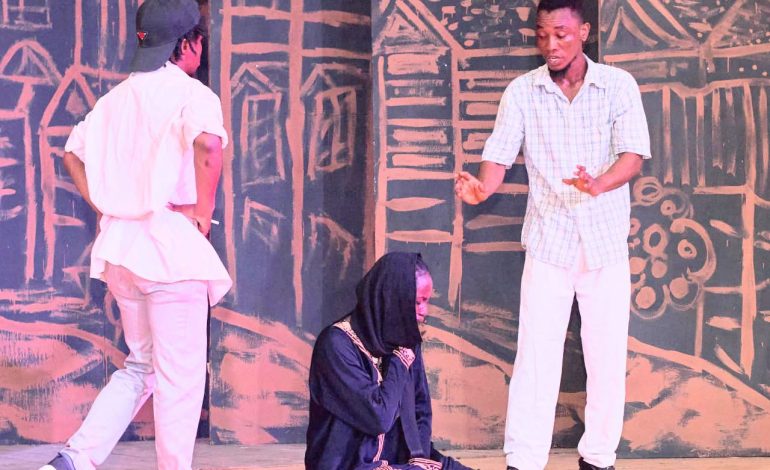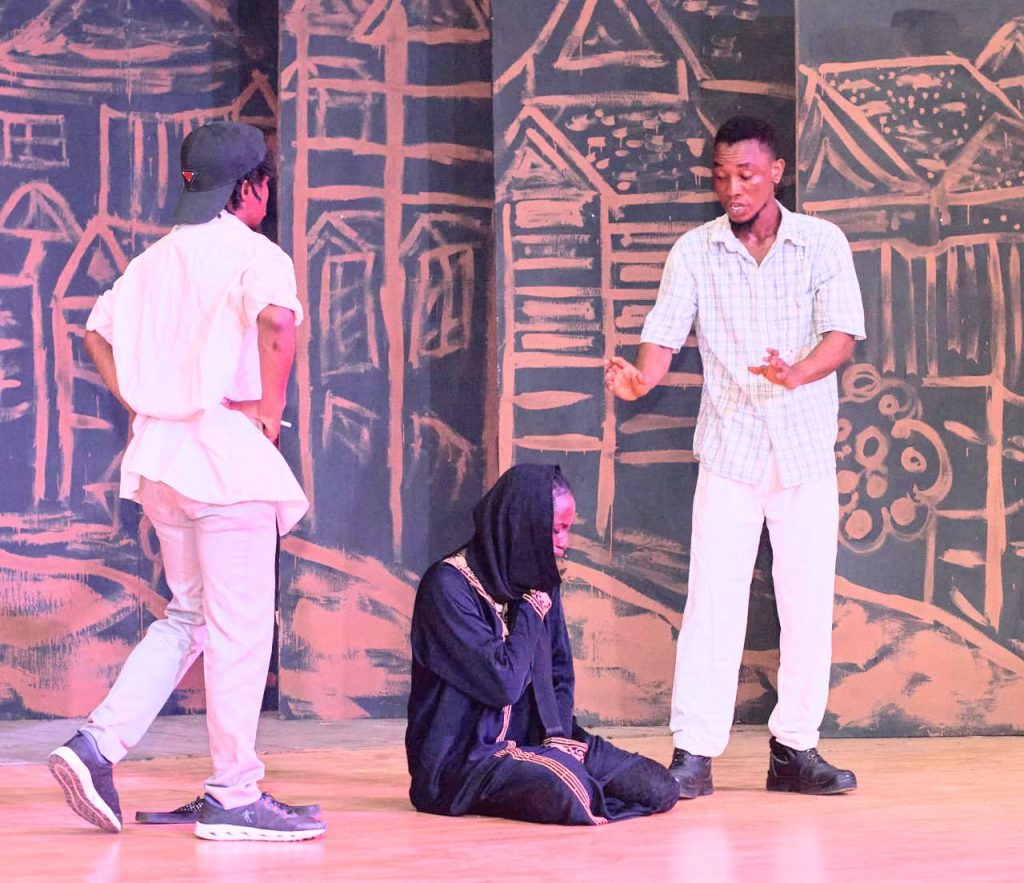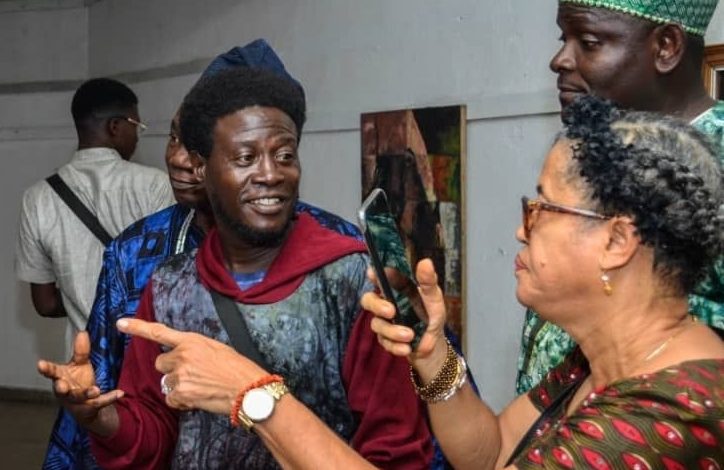Osofisan’s ‘Once Upon Four Robbers’: When student performers take on a master’s work

By Anote Ajeluorou
IMAGINE the pure luck and joy of having a chance to see the performance of a play you’ve not found time to read the book, even as it sits in your bookshelf! It’s no less the work of Emeritus Professor of Drama, Femi Osofisan, the writer with Marxist philosophic inclination, whose No More the Wasted Breed provides counterpoise to Wole Soyinka’s The Wasted Breed in its counter-intuitive reordering of social values in favour of the downtrodden, who he insists must be given agency of life as the nobility . And so in spite of other activities contesting for attention, you set out as early as 8:05am for Ojo, where the environmentally friendly Lagos State University is located. Of course, you want to be wary of Lagos notorious traffic on the Iyana-Oba axis, but that seems all in the past now. Work on the Lagos-Badagry Expressway has progressed admirably, and the former chaos on that flank has fairly been tamed. You heave a sigh of relief and find your way to the Department of Theatre Arts and Film Arts, Faculty of Arts. It’s the first welcoming faculty and department of the university; you turn right as you pass through the university’s double gates, and you’ve arrived.
Doors to the theatre hall are open, with students working or sitting on rows of seats. You make enquiry, and yes, that’s where the performance will take place. You further make enquiries about the director of the play, and he is pointed to you, spotting a chalky, willowy hat. You exchange pleasantries and ask if 10.00am is 10:00am. ‘Ehn, not exactly, sir; probably 11:00am – you know African nah!’ This is about 9:35am. You sigh. African time, of course! So you step outside and at a car-pot roofed rectangular spot, a lady is selling odds and ends, while some students are behind musical instruments and twanging chords here and there. You go beyond that point to grab some snacks and drinks while you wait for the show to start. You’ve come this far; no going back, right?
You settle down on a concrete seat in the leafy park to munch your snacks and drink your soft drink. Across the theatre hall at the same rectangular spot, you hear music peeling out. You hurry your drink to see what’s going on. A student, a lady, is singing into the microphone and some guys are on the instruments drumming and twanging away. Well, her voice could be a little more velvety, more mellifluous to match what she’s mimmicking, but that is no studio, so you listen to her making the most of the foreign music. Not bad, you tell yourself. And then a little later, a guy’s voice, then two guys singing into microphones. It’s Nigeria’s Afrobeats, one of the latest rave songs – Rema’s ‘Calm Down’, and they’re really digging it right. You listen some more, and you see their emerging musicmanship, and the guys on instruments are so on point. You can’t escape but nod along…

Hassan (Hassan Oluwasegun); Alhaja (Oluwagbemisola Akinfe) and Angola (Ayodele Adura) while mourning their executed gang leader and Alhaja’s husband PHOTO: HALLEL OLAMADE
Then it’s time for Osofisan’s Once Upon Four Robbers. It’s 10:56am, not too bad for timing. You pay for your N500 VIP ticket at the theatre hall entrance, and wend your way upfront and settle behind desks draped with clothing, obviously reserved for some VIPs; it turns out that departmental lecturers are the VIPs. It’s a scoring performance; a performance class.
And then the narrator or storyteller (Bolarinwa Ayodele), with a Ghana-must-go bag slung on his shoulder, conscripts the audience into his choir in call-and-response song, and tell them the tale of four young men, whom society pushed to the brink as they take the wrong turn and end up as armed robbers, a dark job for a living. But luck soon runs out for their leader, who is caught. It’s the dark days of the military in power and summary execution at the famous Lagos Bar Beach was the norm. But only a doctor shows up alongside the soldier executioners. No imam, since the convicted robber is apparently a Muslim; at least his wife (Oluwagbemisola P. Akinfe) is an Alhaja, and the crowd baying for blood. This also happens when a second robber, Major (Aderemi P. Oladeji) of the same gang is tied to the stakes for execution. There’s no spiritual leader to usher the soul of the condemned man to hell or heaven after the soldiers pump hot lead into his chest.
When Major, Hassan (Hassan T. Oluwasegun), Angola (Ayodele E. Adura) and the wife of the executed leader meet to mourn him, the audience is treated to the possible disintegration of the group. Major wants out since their leader is dead. He sees the hopelessness of continuing on their dark trade. A burst up between Major and Angola is averted. But the other two and Alhaja think otherwise and cajole him to remain in the gang. They end up reliving their previous exploits and happy times, and their members who performed wonders at their assigned tasks. But even at this, there’s a tinge of regret among the robbers. Many of them have been killed by the same society that pushed them into a life of crime; the four are the last of a big gang. They’re at their wit’s end whither to go. Then Hassan and Major attempt to rob Alfa (Bolarinwa Ayodele), who’s about to say his prayers. But Alfa is not your regular man of Allah; he deploys his African spiritual powers and freezes the two on the spot. When Alhaja and Angola arrive the scene, there’s altercation between them and the Alfa on the morality of the path they’ve chosen. But he relents somewhat and promises to aid their robbery business, but they must deploy it only thrice and quit the business. When he pulls off his white robe to reveal his amulet-studded inner vest, the four robbers are aghast at the transformation – from a pius clergy to a juju man! Such is the mutability of faith.
The Alfa’s charm works as a music performance weapon to disarm any would-be victim or victims. Once they get to a market where they are to rob, they start playing music and dancing to it. Everyone who listens to their music falls into its spell and starts singing and dancing and forget themselves; then they successfully rob anyone within earshot of the music. Even the soldiers deployed to protect the besieged market traders fall victim to the robbers’ charm. But greed and double-dealing are stock-in-trade of criminals. Major gets greedy and wants proceeds of a particular robbery operation he does not participate in all to himself, as his retirement package. In the ensuing quarrel, the soldiers that had also been robbed return and arrest Major while the others escape. As three warders prepare his execution platform, Alhaja appears as a banana seller and cajoles the warders to effect the release of Major on compassionate grounds, but the soldiers catch them in the act.
Again, the narrator returns just before the execution of Major, and poses a moral question before the audience, whom he has once again conscripted into the performance. Between the soldiers, who are in power and have cornered everything for themselves, and the robber whom the soldiers’ bad governance drove into crime, who is guilty and should be executed? Of course, the audience is conflicted, but would rather side with Major at the expense of the oppressors-in-power, who thrive on bribery and corruption. For instance, the contractor who should have built the execution platform made away with the money to indulge in ostentatious living. And the poor warders are made to construct the platform instead.
Osofisan’s Marxist writing of righting the wrongs wrought on hapless citizens by the ruling elite is the thematic thrust of Once upon Four Robbers. How do the poor made poor by a clueless and thieving elite get even with their oppressors? It’s a sharp critique of power abuse and a thieving elite, whose inordinate actions daily push innocent people in crime. In the 1970s/80s, armed robbery was the dark trade in vogue that young people took to in the face of yawning unemployment and bad governance. Now in the 2st1 century, however, ‘yahoo’yahoo’ is armed robbery’s reincarnation. Both then and now, some form of dark art (juju) is deployed to hoodwink victims into parting with their money. And it’s no longer soldiers calling the shots via summary executions t ocurtail the crime; it’s now the turn of the Economic and Financial Crimes Commission (EFCC) which calls the shots and reins in the activities of these young, smart criminals deploying the internet and juju to harvest unmerited wealth.
Overall, it was a barely average performance with flashes of brilliance here and there – Oluwasegun (Hassan) and Oluwagbemisola (Alhaja) stand out and shone bright. Their teachers, who were obviously scoring the performance (mostly 400-level students), however, would have none of what came across to them as insipid, uninspiring performance. What was worse, the students had been encouraged to bring their parents, friends and relatives to see them perform. The director (Aladetan Seth) couldn’t quite situate Osofisan’s theoretical and philosophical basis for the play. Drama theorist Prof. Tunji Azeez couldn’t forgive such tepid performance and made it clear to the parents, friends and everyone present that the performance didn’t in any way represent what the department offers and stands for as a place of excellence in theatre training. He put in down to a lack of zeal among the students to take their training seriously. He went on to name names of past students, who had passed through the department as sterling examples. Other teachers were in agreement with him and pointed out the many flaws that peppered the performance.
For those eager to see the students perform, Oba Koso, Red Is the Freedom Road and Le Voyage are other performances scheduled for the week.



